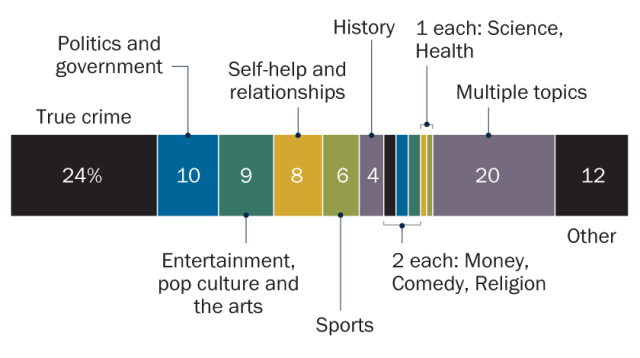An Audio Tour Through America’s Top-Ranked Podcasts

Podcasts have grown increasingly popular over the past decade, becoming part of the daily routine of about one-in-ten Americans. Nearly half of Americans have listened to a podcast in the past year for many reasons, including to learn, for entertainment or just to have something to listen to while doing something else.
Last year, Pew Research Center conducted an analysis of top-ranked podcasts to take a close look at their key characteristics.
The number and variety of podcasts has exploded, with no one topic making up more than a quarter of the top-ranked podcasts in the U.S. To offer a taste of the variety of topics the top-ranked podcasts represent, and to give a sense of what podcast listeners experience, we compiled clips from the shows we studied.
About a quarter of top-ranked podcasts are about true crime
% of top ranked podcasts that are primarily about each topic

About a quarter of top-ranked podcasts are about true crime
% of top-ranked podcasts that are primarily about each topic

1 each:
Science, Health
Politics and government
Self-help and relationships
True crime
History
Other
Multiple topics
10
9
8
4
20
12
24
6
Sports
Entertainment,
pop culture and the arts
2 each: Money, Comedy, Religion
True crime
True crime is the most common topic among top-ranked podcasts, accounting for 24% of the 451 shows we analyzed. These shows – which women and young people tune in to more than men and older listeners – investigate murders, scandals and other criminal acts. Almost all of them (95%) use deep reporting, meaning they examine a story or topic in depth.
Some of these devote a whole season or series to one case, like The Execution of Bonny Lee Bakley, while others spend just an episode per case, like My Favorite Murder. Both shows use deep reporting.
Politics and government
One-in-ten of the top-ranked podcasts focus on politics and government. These podcasts use a variety of formats, with similar shares using interviews (33%), deep reporting (28%) and commentary (28%) to discuss politics and government.
These podcasts span the ideological spectrum, from Pod Save America, an interview-based podcast hosted by several former Obama administration staffers, to conservative-oriented podcasts like Bannon’s War Room, hosted by former Trump adviser Steve Bannon.
Entertainment, pop culture and the arts
Not every podcast is so serious, though. A similar share of top podcasts (9%) are about entertainment, pop culture and the arts. These podcasts tend to cover a specific piece of popular culture. For example, The Official Game of Thrones Podcast offered a look behind the scenes of the hit show, and it used the recap format favored by 36% of entertainment and arts podcasts.
About a quarter of podcasts in this genre (24%) are interview-based, like Brain Structure, hosted by video game designer Hideo Kojima, or The Wire at 20, which explored how the popular TV series was made and the legacy it left behind.
Self-help and relationships
Self-help podcasts make up 8% of the top-ranked shows, offering listeners advice on everything from relationships to personal finance. Some just help motivate listeners.
The Happiness Lab, for one, uses stories and psychological research to offer listeners insights into building a happier life. Like 39% of the top-ranked self-help podcasts, it’s structured around interviews. This episode discusses building a healthy relationship with food.
Sports
Sports podcasts make up 6% of the top-ranked podcast landscape, covering everything from interviews with athletes and sports news to game analysis and predictions. The majority (82%) of these shows are based on commentary, like New Heights with NFL players and brothers Jason and Travis Kelce and Donut Racing Show, a podcast about Formula One racing.
And so much more
Several more genres, from history to comedy to science, each make up less than 5% of the top-ranked podcasts. And one-in-five focus on multiple topics, sometimes even within the same episode. This fragmentation showcases the ways in which niche content has flourished as podcasts have grown increasingly popular.
Podcast audio clips
In order presented:
- My Favorite Murder, “Hollywood Phony”
- Pod Save America, “Is Trump Really Up 10?”
- The Wire at 20, “The Redheaded Stepchild”
- The Happiness Lab, “How to Eat Intuitively”
- Donut Racing Show, “How F1 Drivers Choose Their Racing Numbers”
Acknowledgments
Pew Research Center is a subsidiary of The Pew Charitable Trusts, its primary funder. This essay is based on a June 2023 report by Galen Stocking, Katerina Eva Matsa, Sarah Naseer, Christopher St. Aubin, Elisa Shearer, Mark Jurkowitz and Shreenita Ghosh. That report is a part of Pew Research Center’s ongoing investigation of the state of news, information and journalism in the digital age, a research program funded by The Pew Charitable Trusts, with generous support from the John S. and James L. Knight Foundation.
Christopher Baronavski, Peter Bell and Michael Lipka provided editorial and design guidance. David Kent copy edited, and Christopher St. Aubin checked the accuracy of the text.